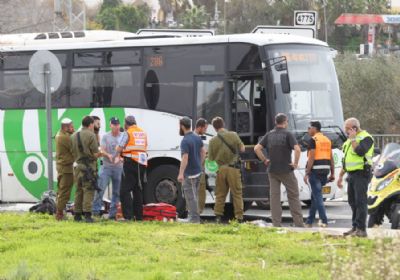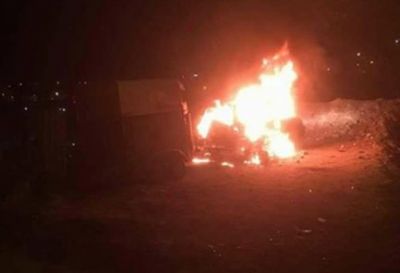Share
What's New
Resources updated Monday, February 5, 2018
February 5, 2018

An Israeli man was stabbed to death in a terror attack at a bus station outside the West Bank settlement of Ariel on Monday afternoon.
The Palestinian assailant arrived at the bus station on foot. He stabbed the Israeli civilian and fled. An IDF officer who saw the attack pursued the terrorist and hit him with his car. The assailant was still able to flee the scene.
The victim, Itamar Ben Gal, is from the Har Bracha settlement and taught in the yeshiva there.
IDF soldiers are now searching the area.
"We will bring them [the terrorist] to justice," Prime Minister Benjamin Netanyahu said at the start of the Likud faction meeting.
"When we arrived at the site, an IDF medic was giving primary care to a 30-year-old man who was unconscious with stab wounds on his upper body," said Magen David Adom emergency medic Mordechai Ya'akov Feder.
"We continued treatment, employing medication to stop the bleeding."
Ben Gal had suffered from multiple wounds to his upper body and was declared dead at Beilinson Hospital.
Yossi Dagan, the head of the Samaria regional council, said in a statement that the location of the attack was a well known hot spot, which he had repeatedly warned about in the past as it was a place that illegal Palestinian workers often disembarked from public transportation.
"This is the second severe attack within a month, but the resident of Samaria are strong. We will not be beat by terror," he said.
On January 9, Rabbi Raziel Shevach, a father of six, was shot dead by Palestinians as he drove near his home in the Havat Gilad outpost.
Two of Shevach's brothers are graduates of the Har Bracha yeshiva.On January 9 Rabbi Raziel Shevach, a father of six, was shot dead by Palestinians as he drove near his home in the Havat Gilad outpost.
The Hamas terror group issued a statement saying that the attack in Ariel was proof that the so-called "knife Intifada" or "Jerusalem Intifada" was still ongoing.
A spree of dozens of stabbing and car ramming attacks by lone-wolf Palestinians that began in October 2016 received the nickname because the attacks were supposedly aimed against Israeli efforts to change the sovereignty of the Temple Mount in the holy city.
Israeli stabbed to death in West Bank Attack, Assailant on the loose Document

Iran has arrested nearly 5,000 people during recent protests, according to an Iranian member of Parliament.
Alireza Rahimi posted on messaging service Telegram last week that local authorities arrested thousands of demonstrators in January, reports Associated Press.
Rahimi said most of the detainees have been released but 492 remained in custody pending investigation.
But further information about the arrestees remain unclear.
Rahimi reportedly confirmed 4,972 arrests with the head of Tehran's prison service. But, according to Iranian Labor News Agency (ILNA), Rahimi said 73 percent of these people were men while Associated Press quoted Rahimi as saying that number was 95%.
A judiciary spokesman told ILNA it was not clear if all of those arrested in January had been involved with the ongoing protests.
Early protests expressed anger over rising egg prices
Iranian protesters chant slogans at a rally in Tehran, Iran, Saturday, Dec. 30, 2017. AP Photo/Ebrahim Noroozi
Iran's recent protests began as a relatively small venture on December 28 in Mashhad, Iran's second largest city, but soon gained traction and have continued into 2018.
Initial protests expressed anger over the economy and the skyrocketing prices of basic necessities like eggs and poultry. The movement was popular with working class citizens under 25, who have suffered under international sanctions which have affected Iran's economic growth.
Protests quickly moved to target Iran's political leaders and calls have been made for the country's supreme leader Ayatollah Ali Khamenei to step down.
At least 21 people have died during demonstrations, including an 11-year-old boy, but the number could be closer to 25.
According to The Guardian, at least three protesters died while in custody in a Tehran prison. And many of the jails holding protestors are notorious for torture.
New protests have seen women calling out the country's hijab laws
Recent protests have again shifted focus, this time objecting to Iran's mandatory hijab laws.
The hijab protests were started by Masih Alinejad, the founder of My Stealthy Freedom, an online movement that opposes the dress code.
The hashtag #WhiteWednesdays quickly spread across social media, with women posting pictures of themselves wearing white as a symbol of protest.
At least 29 women have been arrested in Tehran for removing their headscarves in public. Many women recorded their acts of defiance, waving their headscarves around in busy crowds.
The US has supported recent protests in Iran.
President Donald Trump has praised the protests and criticized the Iranian government. The US State Department said it would use its Farsi Facebook and Twitter accounts to encourage anti-government protests.
Iran accused the US of "grotesque" meddling in its country's socio-economic issues in response.
On Friday, the State Department released a statement in support of the hijab protests and condemned the arrests of the 29 women.
"People should be free to choose the clothes they wear, and practice their faith as they desire. Depriving individuals of this choice undermines their autonomy and dignity," the State Department said.
Nearly 5,000 people were arrested during Iran's bloody month of protests Document

Palestinian police rescued an Israeli man on Friday who was almost lynched by a mob of some 200 Palestinians upon accidentally entering Abu Dis, a Palestinian village several miles east of Jerusalem.
The mob attacked the Israeli man's vehicle at the entrance to the village and threw stones at him. Palestinian police extricated the driver from his vehicle and barricaded themselves inside a nearby building. Meanwhile, the mob gathered around the building and torched the Israeli man's car.
Palestinian authorities reported the incident to the Israel Defense Forces. Around nightfall, IDF and Border Police entered Abu Dis and evacuated the Israeli.
A senior Palestinian police official told Israel Hayom that dozens of villagers gathered around the Israeli man, blocking his path and preventing him from fleeing. According to the official, by the time Palestinian officers arrived at the scene, the mob had grown to some two hundred in number.
"Palestinian police forces," the official said, "arrived a moment before the angry masses lynched him [the Israeli]. The Palestinian police protected him, in coordination with the Civil Administration, the Israeli military and Border Police, which entered the village and joined the Palestinian forces. The Israeli citizen was then handed over to them."
The IDF's Civil Administration is a joint civilian-military body whose duties include coordinating activities and operations with the Palestinian Authority's security apparatus.
A Magen David Adom emergency medical team administered first aid to the victim at the scene and transported him to Shaare Zedek Medical Center in Jerusalem.
The man was lightly injured, having sustained some bruising.
Over the weekend, the Israeli man was debriefed by the Judea and Samaria District Police. He told them that he was on his way home to Tel Aviv when he got lost on the way and entered Abu Dis by mistake.
Lost Israeli narrowly avoids lynch by 200-strong angry Arab mob Document
